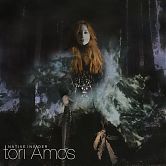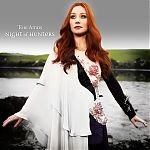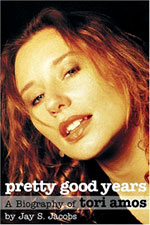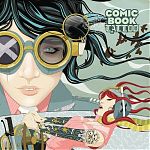- Articles
- Cherries
- Minutiae
- Q&A
- RAINN
- Releases
- Reviews
- Site News
- Them
- Toriphiles
- Touring
- TV/Radio/Web
- Video
News Archives
Keep an eye on our Twitter and Facebook pages since we often post quickie updates there when we're on-the-go.
During tours, we do our best to cover setlists in real-time on Twitter. If you want to tweet a show in, just DM or @ us on the day and tell us to watch your stream that night.
Tori is touring in 2017 to support the release of Native Invader. The European legs runs from early September through early October and the North American leg runs from late October to early December. We do not know if additional dates elsewhere will be added.

Native Invader (album, 2017)

Unrepentant Geraldines (album, 2014)

Gold Dust (album, 2012)

Night of Hunters (album, 2011)

Midwinter Graces (album, 2009)
 Abnormally Attracted To Sin (album, 2009)
Abnormally Attracted To Sin (album, 2009)
Live at Montreux 1991/1992 (DVD, 2008)

American Doll Posse (album, 2007)

A Piano (boxed set, 2006)

Pretty Good Years
(bio, 2006)

Fade To Red
(DVD, 2006)
 Comic Book Tattoo (book, 2008)
Comic Book Tattoo (book, 2008)News: The Star Ledger Reviews Night of Hunters
We’ve been a little hesitant to flood Undented’s front page with all the reviews of Night of Hunters that are popping up — and there are many — but this one from The Star-Ledger caught our eye. In it, classical music critic Ronni Reich and pop music critic Tris McCall have a dialogue about the record, giving a little more perspective and insight into the album that many reviews might reveal…
P.S. We have been posting links to any and all reviews over on our Twitter stream (which we really should export to the sidebar of the site one of these days) so if you’ve been itching to read more critiques of the record, head on over there for that deluge.
CD review: Tori Amos’ ‘Night of Hunters’ — a dialogue
By Ronni Reich/The Star-Ledger
Published: Friday, September 23, 2011
In the early ’70s, art-pop musicians like ELP and Yes drew direct inspiration from Continental classical music. But since the end of the first progressive rock era, few have dared to touch the third rail for fear of getting called pretentious. Tori Amos isn’t afraid of anything — or maybe she’s so used to the “p” word that she doesn’t care anymore. “Night of Hunters,” the latest full-length from Amos, features 14 tracks based on classical pieces. “Hunters” is a song cycle about a faltering relationship in which the narrator encounters a shapeshifter (voiced by Amos’ 11-year-old daughter Natashya Hawley), a fire spirit, and dark forces in the Irish countryside. Since it’s a genre hybrid, classical critic Ronni Reich and pop critic Tris McCall decided to share perspectives in a dialogue.
Ronni Reich: Here we have Tori Amos on the classical label Deutsche Grammaphon writing a song cycle. Is it a departure? Are you evaluating it differently?
Tris McCall: With the exception of the last one, I think all of her albums are departures. The major difference here is that most of the songs aren’t driven by a rock beat. Then again, you can say the same thing about “Boys for Pele.” I guess the most astonishing thing about “Night of Hunters” isn’t that it sounds like typical Tori Amos, because there really isn’t any typical Tori Amos. It’s that if you weren’t told that these songs were based on classical compositions, you might never know. You’d think she was just being her typical expansive and conceptual self. Yet when you do know, you find that the classical ideas are right there in the middle of the songs. She hasn’t digested her source material to the point that its unrecognizable, and she’s not grandstanding and calling attention to it either. She’s handling the classical pieces very well — respectfully, but never too respectfully.
So I evaluate it just as I’d evaluate any other Tori Amos album. I think it makes better sense as part of her ongoing story than “Abnormally Attracted to Sin” did.
RR: I was also really impressed in that regard. She was very straightforward in lifting Schumann for “Your Ghost” but it’s a gorgeous pop ballad in translation. Often, the classical pieces really just felt like jumping off points to me — the tempos, context and elaborations on motifs she uses make them new.
Like in “Shattering Sea,” she takes that chasm between the deep, grumbling left hand and the soft, lyrical right hand in a much higher range in the original Alkan and builds a more rhythmically driven, aggressive, layered portrait of a relationship rift. Here and elsewhere, she textpaints like the classic song composers. It’s fun when she’s referential about what she’s doing too – like singing about a “harmonic defiance” in “Cactus Practice” when the tonality shifts. There’s a part of “Your Ghost” — “He’ll play a Beatles tune/Me more a Bach fugue/Is this such a great divide/Between your world and mine” — that I don’t think is mainly about classical vs. pop, but I think it fits well.
TMC: “Your Ghost” is one of the highlights — it kinda sounds like Sondheim. You can tell she’s been working on a musical theater project. That’s a popular musical theater convention, isn’t it?, singing something that could refer to the music, and having the orchestra respond. Then again, she’s always been inclined to do things like that: there’s that Tori-famous line about pianos trying to be guitars in “Northern Lad,” for instance.
Whoever gave her the pieces to build the songs around must have had great confidence in her ability to interpret classical piano, because many of these composers were also known as butt-kicking piano players. Alkan was considered a virtuoso. I don’t know if his contemporaries considered Satie an offbeat piano genius, but that was his rep when I was taking music theory classes. Enrique Granados was an influential teacher of piano technique. Even rock philistines know about Chopin’s talent. I have to think that “Night of Hunters” is an attempt by somebody to put Tori Amos in that company.
RR: I think the project is certainly recognition of her talent from the classical establishment. I believe she chose the pieces herself though from a large classical library. Even though it’s 400 years of music, there’s some continuity to what she uses and the way she uses it, finding an accompanimental pattern that works almost like a backbeat (“Battle of Trees,” “Nautical Twilight,” “The Chase”) or a melody she can spin into a verse (“Your Ghost,” “Edge of the Moon”).
TMC: My question for you is — I have always thought of Tori Amos as a stupendous rock piano player. Put her in a position to do an upbeat number (“Cornflake Girl” or “Barons of Suburbia”) or a power ballad with a band (“Northern Lad”) and she’s unbeatable. But when she doesn’t have a backbeat, she has a tendency to meander. How’s her classical playing? My instinct is to call the piano on “Night of Hunters” impressive, even if it doesn’t quite excite me the way that those arpeggios on “Caught a Lite Sneeze” do. But I could see a fan of classical music saying that she’s better suited for rock.
RR: I think she’s just a great piano player, regardless of category. I don’t think of what she’s doing here as intended to show off classical piano chops. Even though there are art songs with demanding piano parts (i.e. Schubert’s “Erlkönig”) I think the melding of forces is more important (speaking of which, the Apollon Musagète Quartett and clarinetist Andreas Ottensamer match her style really well). So, I’m pleased with how expressive a pianist she is when she isn’t rocking out – like the way she achieves the duality she speaks of as a main theme of the album – you can really get that hunter-ready-to-pounce vs. vulnerable prey in “Snowblind.”
TMC: How do you feel about her decision to invite her 11-year-old daughter to sing on the record? When Natashya Hawley takes the lead on “Job’s Coffin,” it almost sounds like we’ve dropped the needle on a typical modern London piano pop record. She’s a heck of a singer for a ten year old, but she uses that same taffy-vowel Billie Holliday phrasing that everybody in England uses these days. (Strange that she doesn’t sound anything like Tori Amos.) I understand that Tori Amos wanted another voice to serve her concept, and I also get why she’d want it to be her own daughter. But the voice is so 2011 that it feels like an anachronism. It breaks the spell for me. I am dragged by a cane out of the mystical forest.
RR: I actually heard some of her mother in her sound, possibly because I just don’t expect 11-year-olds to have quirky, colorful, assured voices. Listening again, I hear the Brit similarity but I doubt it’s intentional and I’m too impressed to care.
I like that it’s her daughter who becomes a guiding force, who can see things she can’t, maybe because she’s unencumbered by experience – not “bound by beliefs/that have become steel cords.”
With that said and not at all because of her singing, I feel like the songs she’s on are generally weaker. I could be okay with simpler, prettier, if the ideas didn’t seem overly familiar to me. In “Cactus Practice,” every couple has their own version of what they call truth; In “Snowblind,” freeing yourself from time and questioning the difference between lovers and enemies; the empowerment message/fixation on women giving themselves away that surfaces in “Job’s Coffin.” I think “The Chase” is more interesting musically and the playfulness of the lyrics is endearing.
RR: How do you feel about the overarching concept of Night of Hunters and how successful is the execution?
TMC: It usually takes awhile for a Tori Amos theme to become clear. Sometimes it never becomes clear: I’m still looking for those thematic gardens of ideas on “The Beekeeper,” and I’ve listened to that one a hundred times. Like “Scarlet’s Walk,” “Night of Hunters” comes pre-loaded with a story, but I don’t think that story coheres as well as “Scarlet” does. Surely that is because a trip through all 50 states after 9/11 is going to be more vivid for American listeners than a fable containing a shapeshifter and a fire muse. There are times on “Night of Hunters” where the language fits the fairy tale theme very well, and other times when she stumbles into bad prosody from social science textbooks: the moment on “Job’s Coffin” where she writes about “grids of disempowerment” comes to mind.
The comparison I keep wanting to make is the Decemberists’ “Hazards of Love.” That one was a rock opera, but Colin Meloy sang most of the parts just as Amos does here. “Hazards” was also a doomed-romance fable, and like most modern fables, it was deadly serious and ponderous at times. The Decemberists album might have been a little too concrete and story-driven for its own good — it ends like “Titanic” with even fewer hearts going on. I’m still trying to figure out how “Night of Hunters” ends. “Carry” suggests that the narrator has made it through her ordeal with the spirits with her sanity and optimism intact, and that’s great. But what are the dark forces invading children’s dreams on “Night of Hunters” (the song)? I crave specifics. Fables are so imprecise. If she wanted me to be more emotionally involved in the story she’s telling, she’s going to have to make these characters real people.
Her reputation as a fabulist precedes her, and we all know how she feels about the fairies. But I think Tori Amos is at her best when she is singing about real things. She’s so good at adding poetic resonance to common experiences that I wish she’d do more reporting from the field. I don’t just mean the “Scarlet’s Walk” album, but songs like “Jackie’s Strength,” too. That gave us her perspective on a particular moment in history — the Kennedy assassination and life in the mid-‘60s and ’70s — and it was an instructive and believable one. I am sure if you asked her, she’d say “Yes, Anastasia” was about vulnerability and female persistence and all the other emotional states that inspire her. But it was also about a historical figure. That makes a huge difference.
RR: I agree about the grid of disempowerment. I actually felt like this was mostly clear in terms of the big-picture contours of the interpersonal and intrapersonal conflicts. I’m fascinated by the way she takes a very real, understandable situation—where we do have a sense of the characters and their flaws—and bring it into fantasy terms. Like in “Fearlessness,” by the last lines, we know the narrator is trying to figure out what went wrong in the relationship – “Did we…find fault in every gift?” – but we’re in this underworld of wild horses, demons and sirens.
I saw the dark creatures as bad influences, self-doubt, over-confidence, unrealistic expectations of love. I thought the end was about the man’s death and lost loved ones living on as stars. And I was frustrated by how trite that seemed because it was one of my favorites musically. Maybe I’m misinterpreting? Is this linked to “Your Ghost”? Hmm…
When I think of major song cycles like “Winterreise,” “Dichterliebe,” “Die Schöne Müllerin,” I tend to think about reflections on a relationship linked to nature and a journey. Of course the range is much broader, especially in contemporary music—I’d call “Scarlet’s Walk” a song cycle—but I think she’s within the old tradition (with more extensive diversions.)
TMC: The more I think about it, the more “Night of Hunters” reminds me of “The Hazards of Love” album.
In both cases, you have an American narrator who has fallen under the spell of European mythology. Amos takes as her source Continental classical music, and Colin Meloy draws from British folk-rock. Both set their stories at night in remote regions that are still privy to Celtic haunting: “Hazards” takes place on the Scottish taiga, and “Hunters” is a story of Ireland. The reason these Celtic redoubts work so well for fairytales and fantasy stories (I’m thinking of Susan Cooper’s “The Dark is Rising” series, too.) is because American writers believe that Christianity didn’t penetrate those regions quite as thoroughly as they did the rest of the Continent. So there are beasties still living in the woods, and they’re usually shapeshifting spirits — Annabelle in “Hunters,” and Sweet William in “Hazards.” And both Meloy and Amos make good, spooky use out of the trees: They symbolize ancient wisdom and confusion, and the forces of nature; they’re thickets of symbolism and mysticism. Whether actual Europeans feel this way about the Celtic regions is a good question. I guess J.K. Rowling’s decision to plop Hogwarts in distant Scotland suggests the answer is yes.
TMC: Is there a classical-pop crossover project that this one reminds you of? Do you feel there’s anything unprecedented here?
RR: I don’t think it’s unprecedented but I think right now, these projects are coming more out the contemporary classical/new music world with composer/performers who tread the crossover successfully, like Sarah Kirkland Snider with her Odyssey-inspired song cycle “Penelope” (http://penelope-music.com/#/audiovideo/). Also Matt Marks’ opera “The Little Death” -http://mattmarksmusic.com/music/
Maybe Elvis Costello’s “Juliet Letters?”
TMC: I don’t think “Night of Hunters” is all that much like “The Juliet Letters.” I’m not sure anything is like “The Juliet Letters.” That wasn’t based on classical themes. That was an attempt to take Elvis Costello-style sophisticated pop songs and arrange them for a string quartet. The members of the Brodsky Quartet get co-writing credit on those albums, but “Jacksons, Monk, and Rowe,” “This Offer Is Unrepeatable,” “The Letter Home” — it’s hard to imagine those narratives, or those melodies, coming from anybody but Costello. Tori Amos isn’t the tunesmith that Costello is (because nobody is), and there’s not much of an attempt to be catchy on “Night of Hunters.” “The Juliet Letters” is a perversely catchy album — “I Almost Had A Weakness,” that’s a catchy number. Most of the songs have verses and repeated choruses in classic pop style. “Night of Hunters” is much more indebted to classical sources than “Juliet” was. “Juliet” is just plain weird — maybe one of the weirdest albums ever made by a major artist, and definitely the weirdest Costello album.
RR: What is your overall impression?
TMC: If you’re a fan, you know that the only time a Tori Amos album is inessential is when she’s repeating herself (“Abnormally Attracted to Sin,” “Venus and Back”). Any time she tries something new, it’s worth getting to know. I would have liked a few more upbeat numbers, but in 2011 I know that Tori Amos doesn’t cook to order.
Putting it in the context of her career, this is a little like when she followed up “Venus” and “Strange Little Girls” with “Scarlet’s Walk.” Around the time of “Venus” and the covers album, there was a feeling among many fans on the old rec.music.tori-amos usenet board that Amos might be running on fumes — that all the touring and experimentation had worn her out a bit, and maybe she needed a nap. “Scarlet’s Walk” was many things, and one of those things was Amos saying “uh-uh, I’m still the concept-master.” And the album was long and drawn-out and story-driven, and parts of it were boring, but the listener never got the sense that the artist had less than her whole brain engaged. “Abnormally Attracted To Sin” also sounded like Amos was running dry. Again she’s come back with a big-concept record that’s long and intricate and dull at times, but where the artist sounds completely in command. “Hunters” may not end up being my favorite Tori Amos album, but after this, I’m never going to doubt her again. I should have learned my lesson after “Scarlet’s Walk” came out.


